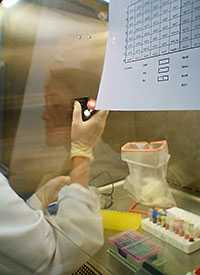Division of Bacterial Diseases (DBD) News Bulletin
Summer 2016, Issue 18
In This Issue
Epi-Aids and Investigations
Meningococcal Epi-Aid—New Jersey, May 2016. A team of epidemiology staff was deployed to assist the New Jersey Department of Health in defining the population at risk for serogroup B meningococcal disease and determining a strategy for MenB vaccination in response to a cluster of disease at a university.
Group A Streptococcal Epi-Aid—Chicago, Illinois, March 2016. A team was deployed to assist the Illinois Department of Public Health in determining sources of infection, risk factors for disease, and recommendations to stop transmission at a long-term care facility.
Meningococcal Epi-Aid—Boston, Massachusetts, March 2016. A team was deployed to assist the Massachusetts Department of Public Health, in collaboration with the Boston Public Health Commission, in investigating an outbreak among Boston’s homeless population. The investigation helped researchers better understand factors contributing to the increased risk of meningococcal disease among this population, potential barriers to chemoprophylaxis, and vaccination acceptance. The information and data will help inform future prevention and control activities in this population.

Photo: DBD’s Jeni Vuong conducts PCR testing at the Tamale, Ghana Public Health Laboratory during a meningitis outbreak investigation in Ghana in February 2016.
Meningococcal Carriage Evaluation—Rhode Island, March 2016. A team of epidemiology and laboratory staff was deployed to conduct the fourth round of a Neisseria meningitidis carriage evaluation following a serogroup B outbreak at a college.
Meningococcal Carriage Evaluation—Oregon, March 2016. A team of epidemiology and laboratory staff was deployed to conduct the fourth round of a Neisseria meningitidis carriage evaluation following a serogroup B outbreak at a university.
Meningitis Investigation—Ghana, February 2016. At the request of the Ghana Ministry of Health, epidemiology and laboratory staff deployed to provide technical assistance to the Ministry and the World Health Organization (WHO) for an outbreak response to both pneumococcal and meningococcal meningitis in districts in the northern area of the country. During the team’s 2-week stay, they conducted hands-on training for lab staff in molecular diagnostics for confirmation and typing of meningitis-causing pathogens to help Ghana strengthen its in-country laboratory capacity. Epidemiology staff provided technical assistance with the local outbreak investigation. The Ministry and WHO secured 160,000 doses of meningococcal vaccine for three districts in the northern area of the country to help stop such outbreaks. Read more about this investigation.
- Page last reviewed: June 30, 2016
- Page last updated: June 30, 2016
- Content source:


 ShareCompartir
ShareCompartir